Abstract
The present studies demonstrate that iodine depletion increases the sensitivity of the thyroid to the goitrogenic effects of thyrotropin. Iodine depletion was induced by feeding rats a low iodine diet containing propylthiouracil for 10-14 days before hypophysectomy. Accumulation of iodine in the thyroid after hypophysectomy was prevented by continuing the antithyroid drugs in the diet. Doses of thyrotropin as low as 3 mU/100 g of body weight per day produced significant thyroid enlargement in 3-7 days in iodine-depleted rats. Adding propylthiouracil or perchlorate to the diet during treatment with thyrotropin did not reduce or augment the goitrogenic response to thyrotropin in iodine-depleted rats. Increasing the level of circulating iodide also did not reduce the goitrogenic response to thyrotropin. The increased sensitivity of the iodine-depleted thyroid gland may provide an explanation for the development of thyroid enlargement without requiring an increased level of circulating thyrotropin.
Full text
PDF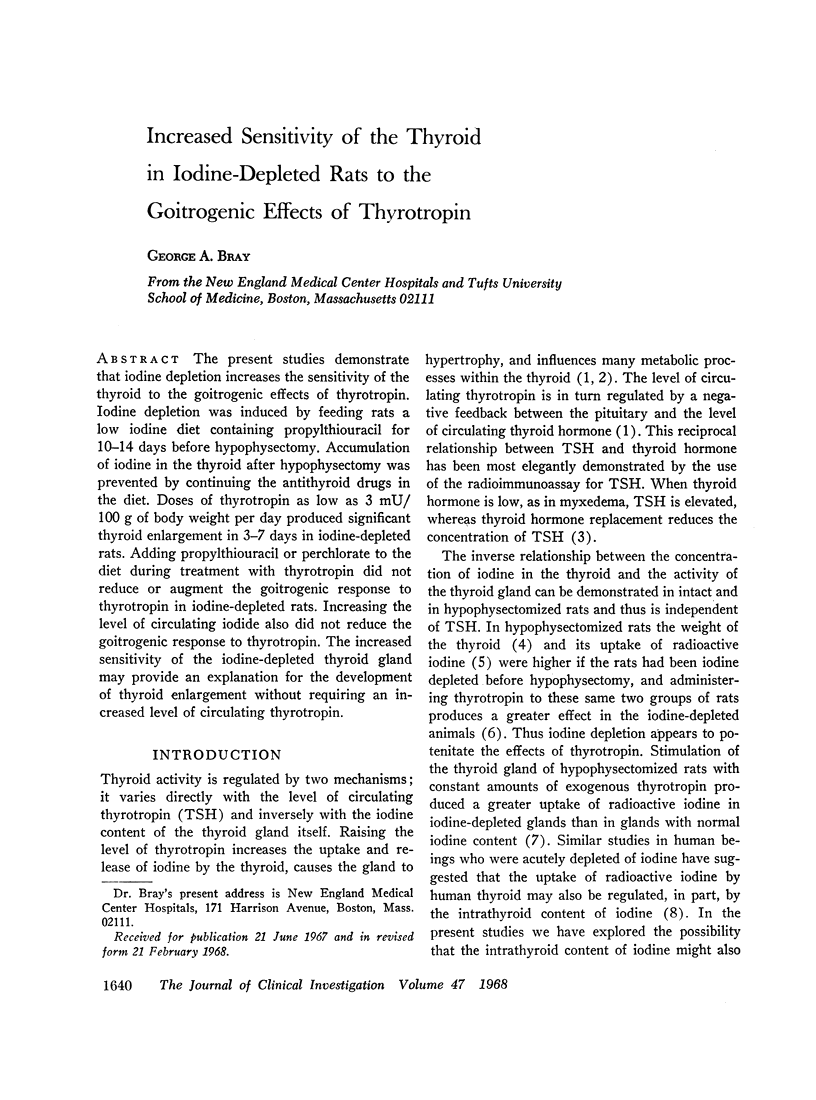
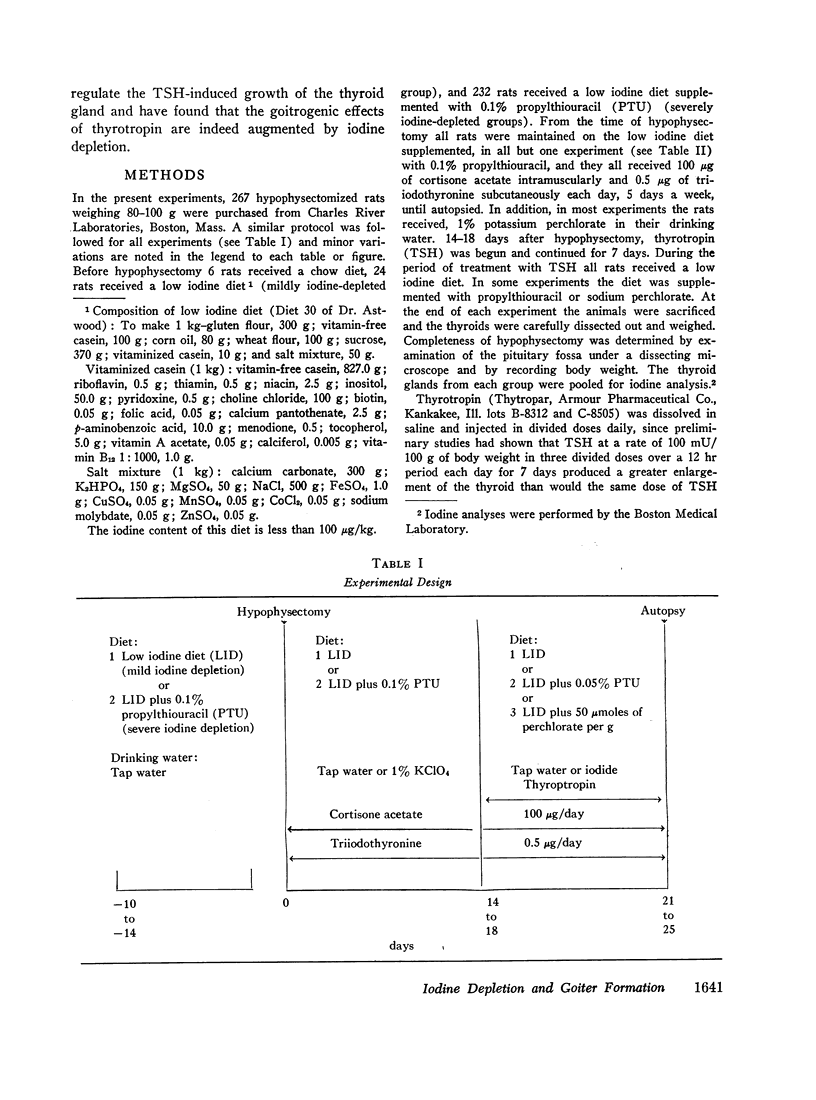
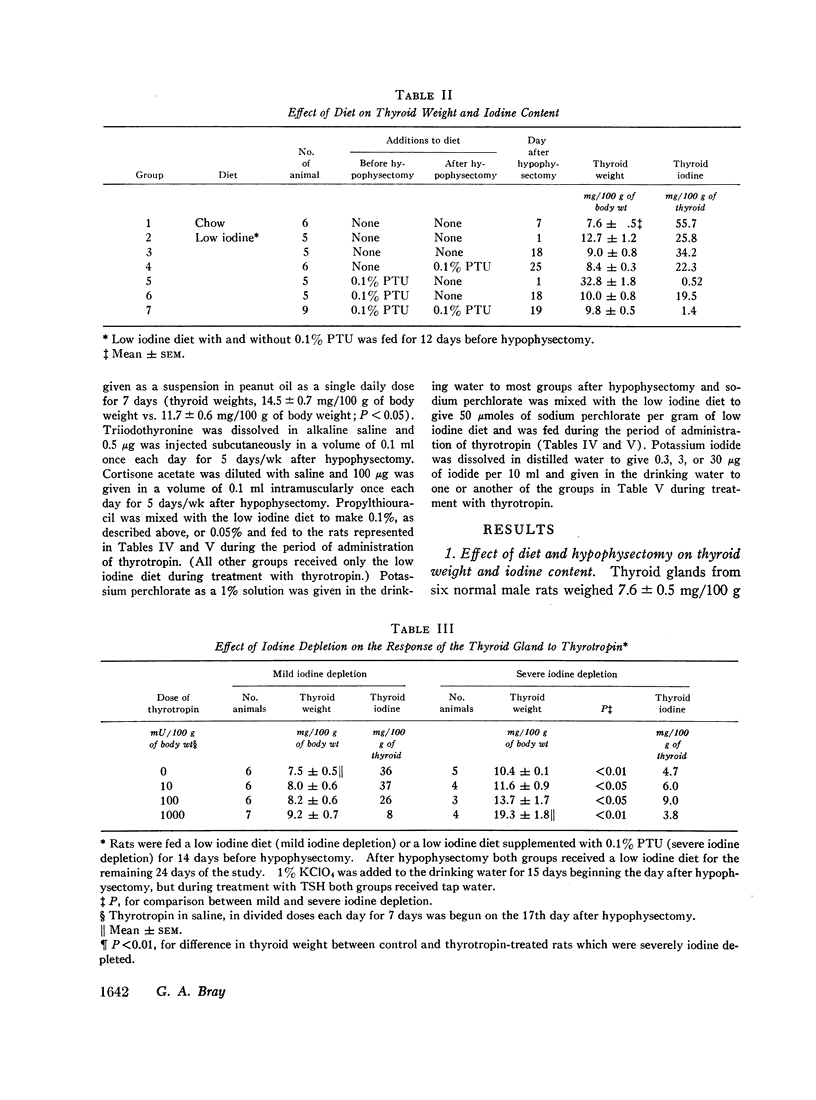
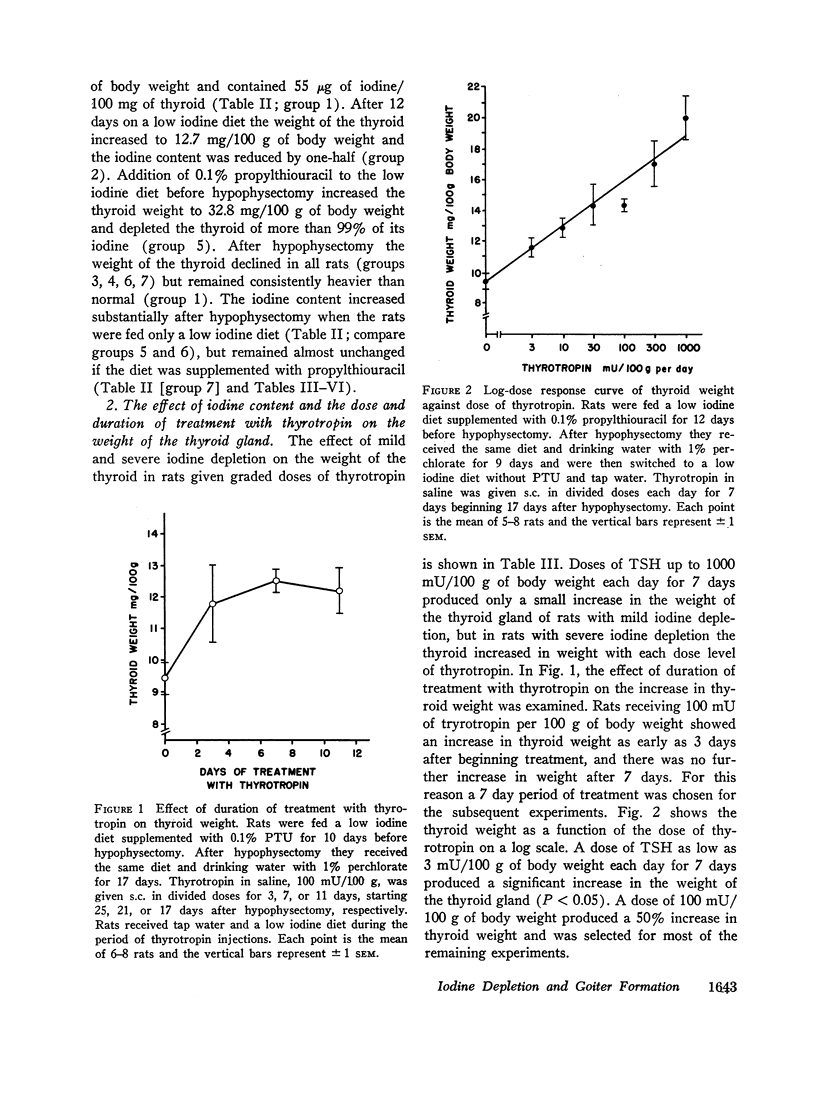

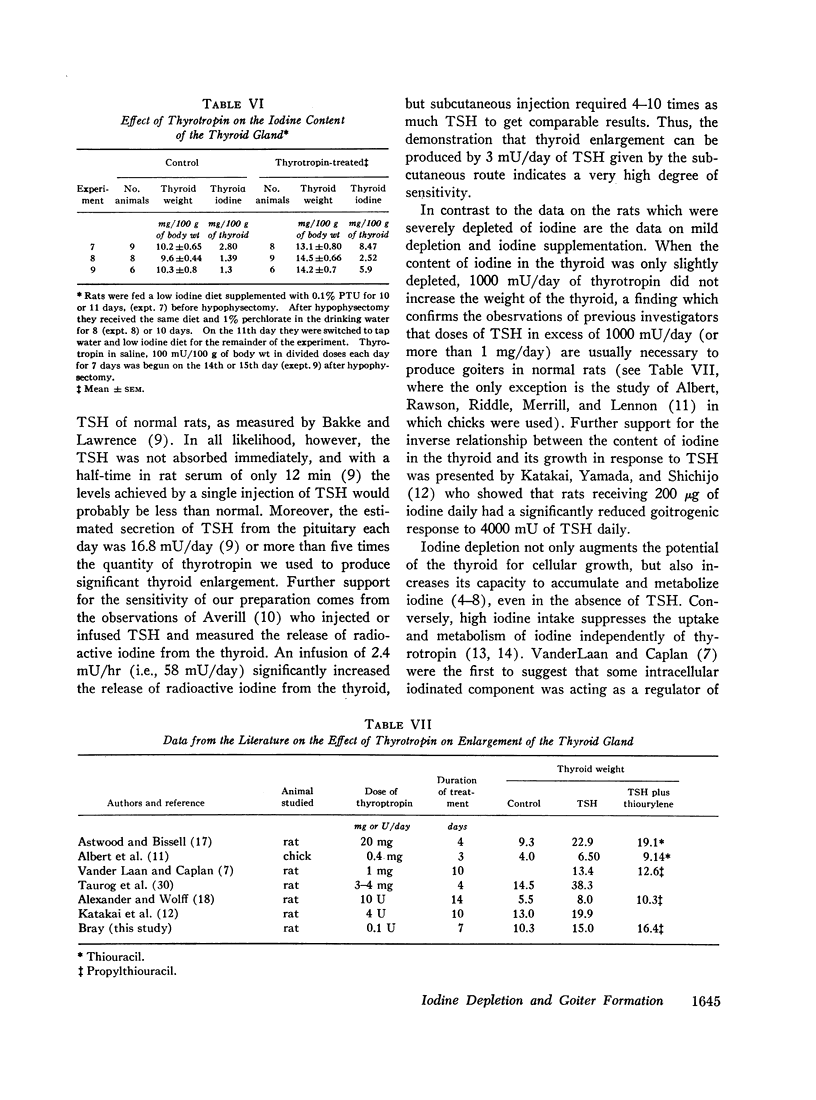
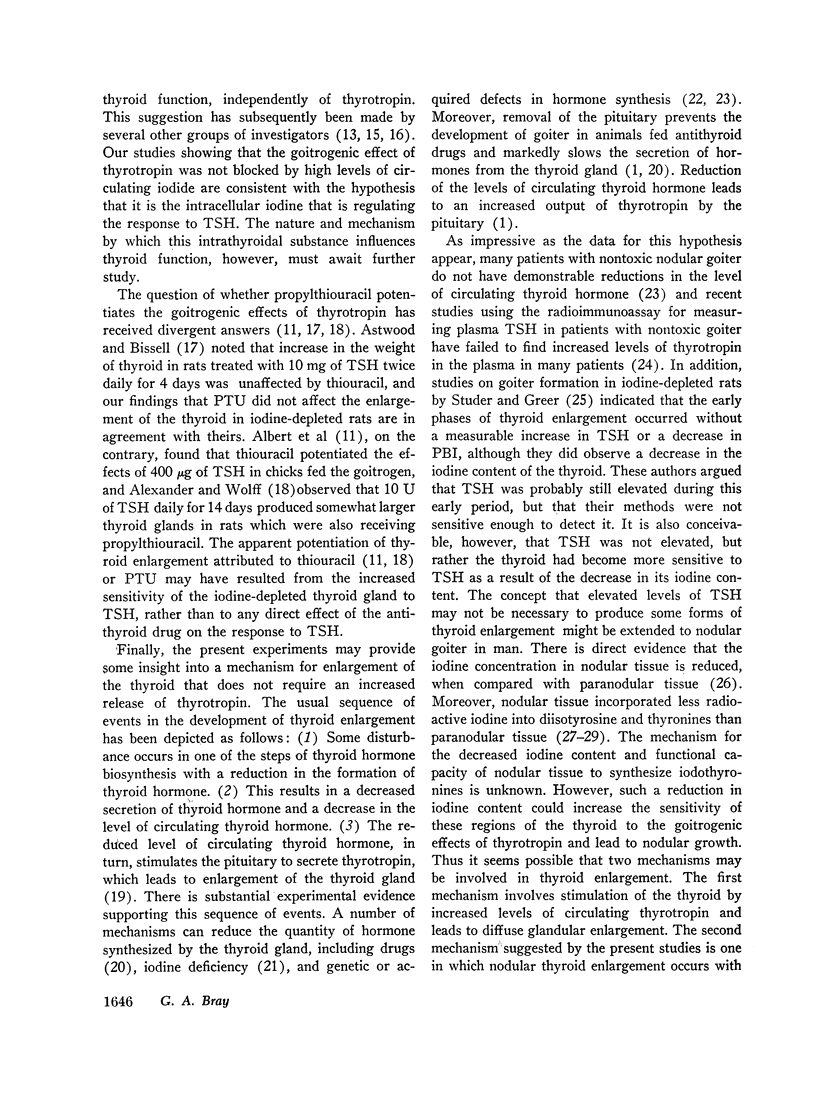
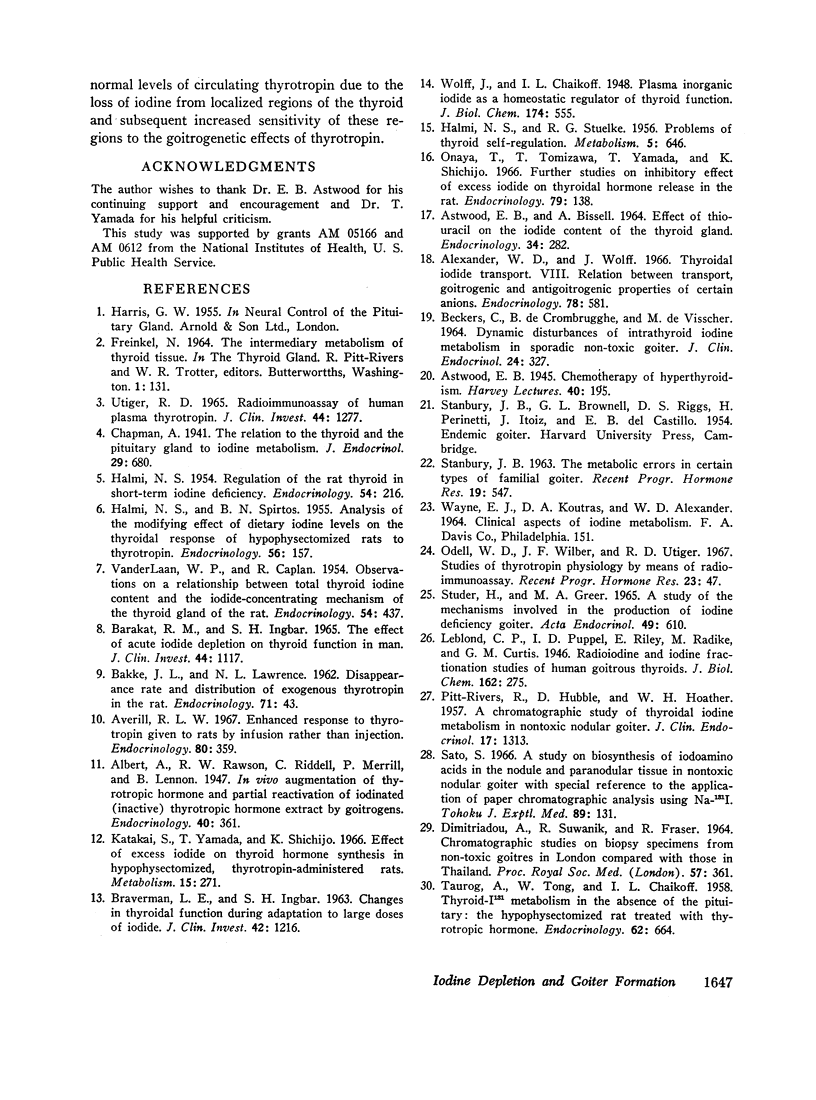
Selected References
These references are in PubMed. This may not be the complete list of references from this article.
- Alexander W. D., Wolff J. Thyroidal iodide tranpsort. 8. Endocrinology. 1966 Mar;78(3):581–590. doi: 10.1210/endo-78-3-581. [DOI] [PubMed] [Google Scholar]
- Averill R. L. Enhanced response to thyrotropin given to rats by infusion rather than injection. Endocrinology. 1967 Feb;80(2):359–360. doi: 10.1210/endo-80-2-359. [DOI] [PubMed] [Google Scholar]
- BAKKE J. L., LAWRENCE N. L. Disappearance rate and distribution of exogenous thyrotropin in the rat. Endocrinology. 1962 Jul;71:43–56. doi: 10.1210/endo-71-1-43. [DOI] [PubMed] [Google Scholar]
- BARAKAT R. M., INGBAR S. H. THE EFFECT OF ACUTE IODIDE DEPLETION ON THYROID FUNCTION IN MAN. J Clin Invest. 1965 Jul;44:1117–1124. doi: 10.1172/JCI105218. [DOI] [PMC free article] [PubMed] [Google Scholar]
- BECKERS C., DECROMBRUGGHE B., DEVISSCHER M. DYNAMIC DISTURBANCES OF INTRATHYROID IODINE METABOLISM IN SPORADIC NONTOXIC GOITER. J Clin Endocrinol Metab. 1964 Apr;24:327–333. doi: 10.1210/jcem-24-4-327. [DOI] [PubMed] [Google Scholar]
- BRAVERMAN L. E., INGBAR S. H. CHANGES IN THYROIDAL FUNCTION DURING ADAPTATION TO LARGE DOSES OF IODIDE. J Clin Invest. 1963 Aug;42:1216–1231. doi: 10.1172/JCI104807. [DOI] [PMC free article] [PubMed] [Google Scholar]
- DIMITRIADOU A., SUWANIK R., FRASER R. CHROMATOGRAPHIC STUDIES ON BIOPSY SPECIMENS FROM NONTOXIC GOITRES IN LONDON COMPARED WITH THOSE IN THAILAND. Proc R Soc Med. 1964 May;57:361–364. [PMC free article] [PubMed] [Google Scholar]
- HALMI N. S. Regulation of the rat thyroid in short-term iodine deficiency. Endocrinology. 1954 Feb;54(2):216–224. doi: 10.1210/endo-54-2-216. [DOI] [PubMed] [Google Scholar]
- HALMI N. S., SPIRTOS B. N. Analysis of the modifying effect of dietary iodine levels on the thyroidal response of hypophysectomized rats to thyrotrophin. Endocrinology. 1955 Feb;56(2):157–160. doi: 10.1210/endo-56-2-157. [DOI] [PubMed] [Google Scholar]
- HALMI N. S., STUELKE R. G. Problems of thyroidal self-regulation. Metabolism. 1956 Nov;5(6 Pt 1):646–651. [PubMed] [Google Scholar]
- Katakai S., Yamada T. Effect of excess iodide on thyroid hormone synthesis in hypophysectomized, thyrotropin administered rats. Metabolism. 1966 Mar;15(3):271–278. doi: 10.1016/0026-0495(66)90025-4. [DOI] [PubMed] [Google Scholar]
- Odell W. D., Wilber J. F., Utiger R. D. Studies of thyrotropin physiology by means of radioimmunoassay. Recent Prog Horm Res. 1967;23:47–85. doi: 10.1016/b978-1-4831-9826-2.50005-2. [DOI] [PubMed] [Google Scholar]
- Onaya T., Tomizawa T., Yamada T., Shichijo K. Further studies on inhibitory effect of excess iodide on thyroidal hormone release in the rat. Endocrinology. 1966 Jul;79(1):138–148. doi: 10.1210/endo-79-1-138. [DOI] [PubMed] [Google Scholar]
- PITT-RIVERS P., HUBBLE D., HOATHER W. H. A chromatographic study of thyroidal iodine metabolism in nontoxic nodular goiter. J Clin Endocrinol Metab. 1957 Nov;17(11):1313–1323. doi: 10.1210/jcem-17-11-1313. [DOI] [PubMed] [Google Scholar]
- STANBURY J. B. THE METABOLIC ERRORS IN CERTAIN TYPES OF FAMILIAL GOITER. Recent Prog Horm Res. 1963;19:547–577. [PubMed] [Google Scholar]
- STUDER H., GREER M. A. A STUDY OF THE MECHANISMS INVOLVED IN THE PRODUCTION OF IODINE-DEFICIENCY GOITER. Acta Endocrinol (Copenh) 1965 Aug;49:610–628. doi: 10.1530/acta.0.0490610. [DOI] [PubMed] [Google Scholar]
- Sato S. A study on biosynthesis of iodoamino acids in the nodule and paranodular thyroid tissue in nontoxic nodular goiter with special reference to the application of paper chromatographic analysis using Na-I-131. Tohoku J Exp Med. 1966 Jun 25;89(2):131–142. doi: 10.1620/tjem.89.131. [DOI] [PubMed] [Google Scholar]
- TAUROG A., TONG W., CHAIKOFF I. L. Thyroid I131 metabolism in the absence of the pituitary: the hypophysectomized rat treated with thyrotropic hormone. Endocrinology. 1958 May;62(5):664–676. doi: 10.1210/endo-62-5-664. [DOI] [PubMed] [Google Scholar]
- UTIGER R. D. RADIOIMMUNOASSAY OF HUMAN PLASMA THYROTROPIN. J Clin Invest. 1965 Aug;44:1277–1286. doi: 10.1172/JCI105234. [DOI] [PMC free article] [PubMed] [Google Scholar]
- VANDERLAAN W. P., CAPLAN R. Observations on a relationship between total thyroid iodine content and the iodide-concentrating mechanism of the thyroid gland of the rat. Endocrinology. 1954 Apr;54(4):437–447. doi: 10.1210/endo-54-4-437. [DOI] [PubMed] [Google Scholar]


